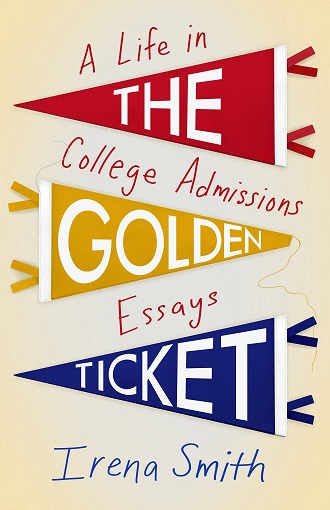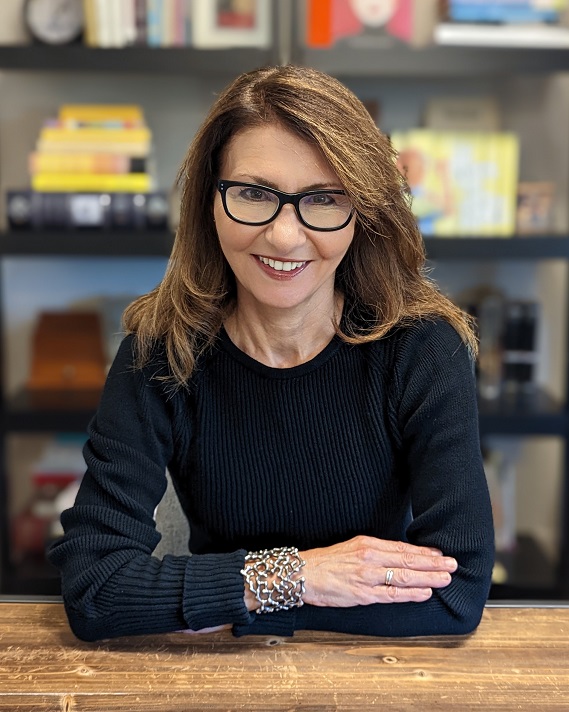I’ve always been fascinated by creative nonfiction, and I was inspired by David Sedaris’ early collections of essays, “Naked” in particular. The stories are so weird and joyful, and I love how unabashedly he celebrates his own and his family’s eccentricities and quirks.
Irena Smith – 18 April 2023
The Back Flap
Palo Alto, California, is home to stratospheric real estate prices and equally high expectations, a place where everyone has to be good at something and where success is often defined by the name of a prestigious college on the back of a late-model luxury car. It’s also the place where Irena Smith—Soviet émigré, PhD in comparative literature, former Stanford admission reader—works as a private college counselor to some of the country’s most ambitious and tightly wound students . . . even as, at home, her own children unravel.
Narrated as a series of responses to college application essay prompts, The Golden Ticket combines sharp social commentary, family history, and the lessons of great (and not so great) literature to offer a broader, more generous vision of what it means to succeed.
About the book
What is the book about?
Short answer: it’s about what happens when parents set out to do what they think is best for their children.
The longer answer is that it’s about my double life— college admissions counselor by day and mom to three neurodiverse children by night—set against the backdrop of exorbitant expectations (my parents’ for me, mine for my own children, and the parents of the students I work with for their children). It’s about how my parents arrived in San Francisco from the former Soviet Union with four suitcases and nine-year-old me in tow, full of dreams and expectations for the future. It’s about how I thwarted those expectations and about how my children thwarted my expectations and about the weight of the expectations the students I work with are carrying. It’s also about The Brady Bunch, Kellogg’s Corn Pops, great literature, not-so-great literature, college application essays, domestic mayhem, and improv comedy.
When did you start writing the book?
In the early 2000s, although the funny thing is that I didn’t know it was going to be a book until a few years ago. It started as a few short essays after our oldest son was diagnosed with autism—and, because he had done so well with early behavioral intervention, the idea was that the story would culminate in a triumphant ending (“…and then we beat autism and lived happily ever after”). But then my husband and I had more children and I began working in the Stanford admissions office and subsequently as a private college admissions counselor, and the juxtaposition between the striving, ambitious students and parents in my practice and our chaotic home life made for a far messier, more complicated narrative, so the book kept evolving as my life kept evolving. Twenty-ish years later, ta da! (In my defense, it’s hard to write in the midst of a chaotic home life and a busy college counseling practice.)
How long did it take you to write it?
If you count the earliest essays, 20-plus years and one weekend. I worked on it piecemeal, eventually corralling the essays into something resembling a chronological narrative. In spring of 2020, I connected with my agent, and since I didn’t know what a book proposal was, she asked me to send her the entire manuscript. I wasn’t about to tell her that I didn’t have a manuscript per se, and since this was on a Friday, I asked if I could have the weekend for final touches (all casual-like, while screaming internally). Then I spent the next 72 hours frantically revising and trying to map a coherent narrative throughline. Fortunately, she liked the resulting version enough to take me on—and, to my great good luck, also happened to be a gifted and generous editor who helped shape the book into its final form.
Where did you get the idea from?
I’ve always been fascinated by creative nonfiction, and I was inspired by David Sedaris’ early collections of essays, Naked in particular. The stories are so weird and joyful, and I love how unabashedly he celebrates his own and his family’s eccentricities and quirks. (“A Plague of Tics” and “Get Your Ya-Yas Out” are two of my absolute favorites.)
Were there any parts of the book where you struggled?
Finding the right title was an ordeal—at least as difficult as coming up with the right name for a baby.
What came easily?
Some of the essays felt like they wrote themselves—when I have an idea of what I’m trying to say, there’s an incredible sense that the words are arranging themselves on the page as though by magic. If only that happened more often!
Are your characters entirely fictitious or have you borrowed from real world people you know?
Everyone is entirely real, although I changed some names and blurred identifying details to protect the privacy of the students and families I worked with. No offense to fiction, but it has nothing on some of the situations and people I encountered in my practice.
We all know how important it is for writers to read. Are there any particular authors that have influenced how you write and, if so, how have they influenced you?
My dissertation was on Henry James and Vladimir Nabokov, and to this day you can find echoes of these writers—Nabokov’s recondite diction, James’s winding, sinuous sentences—in my own writing. Beyond James and Nabokov, reading David Sedaris was a revelation—his voice is so distinctly acerbic, so much his own, that I felt like it gave me permission to write as myself, snarky asides and all. And I’m inspired by (and deeply envious of) Jeanette Winterson’s crystalline prose in Why Be Happy When You Can Be Normal? and Patricia Lockwood’s astonishing poetry-prose and unhinged lunacy in Priestdaddy.
Do you have a target reader?
Someone who nods and occasionally laughs out loud while reading my writing. Someone who appreciates dark humor, literary allusions, and irreverent takes on serious topics.
About Writing
Do you have a writing process? If so can you please describe it?
My “process” goes something like this: don’t write for weeks, feel guilty about not writing, reluctantly write something, decide it’s terrible, abandon it for another couple of weeks, get an idea out of nowhere and bang out five pages in an hour, let it sit, edit, receive a non-negotiable deadline, write nonstop, finish in the nick of time, ask yourself why you didn’t just start writing earlier or write for 15 minutes every day like a normal person, repeat.
Do you outline? If so, do you do so extensively or just chapter headings and a couple of sentences?
Outlines scare me; I’ll jot down a sentence or two to remind myself of a phrase or a detail, but for the most part I let whatever I’m writing tell me how it wants to unfold.
Do you edit as you go or wait until you’ve finished?
Both. If I leave a piece unfinished, I always start by revising from the beginning, not writing from where I left off. This allows me to pick up the narrative momentum; then, once I’m done with a piece, I’ll edit from start to finish.
Did you hire a professional editor?
Yes; I worked with Elyse Fenton, who is a poet, a writer, and an absolutely brilliant editor.
Do you listen to music while you write? If yes, what gets the fingers tapping?
I don’t, but I like to write in coffee shops. The ambient noise is perfect, and if there’s music playing in the background, so much the better. I’m not picky.
About Publishing
Did you submit your work to Agents?
Yes, to no avail. I was extraordinarily lucky to find my agent, Nicki Richesin, who, apart from tirelessly championing my book, was also a gifted editor who helped transform my memoir from a disheveled collection of vignettes into its final incarnation.
What made you decide to go Indie, whether self-publishing or with an indie publisher? Was it a particular event or a gradual process?
Racking up 60+ rejections from traditional publishers made it pretty clear that if I wanted the book to be published, I’d have to go with an indie publisher or publish it myself. Fortunately, my agent knew Brooke Warner, the publisher of She Writes Press, and she connected us. I’m thrilled to be part of this close-knit, encouraging community of talented women authors, editors, and designers, where I’ve found not only incredible support but also new friends.
Did you get your book cover professionally done or did you do it yourself?
Lindsey Cleworth designed the cover, and I’m so grateful for her ability to capture the essence of the book so clearly.
Do you have a marketing plan for the book or are you just winging it?
I’m working with a fantastic publicity team at BookSparks.
Any advice that you would like to give to other newbies considering becoming Indie authors?
Believe in your work. Ask questions. Read Jane Friedman’s blog; she has some terrific advice for authors considering indie or hybrid publishing.
About You
Where did you grow up?
Moscow for the first nine years of my life, then San Francisco for the next three, then Sunnyvale—the heart of Silicon Valley—where my family lived until I went to college.
Where do you live now?
The San Francisco Bay Area
What would you like readers to know about you?
I was voted Most Likely to Talk to Anyone or Anything About Anyone or Anything as a high school senior, a title I remain inordinately proud of to this day.
What are you working on now?
A collection of essays about family road trips, inspired by a 1930s travelogue by two unjustly forgotten Soviet authors.
End of Interview
For more from Ms Smith visit her website and follow her on Facebook and Twitter.
Get your copy of The Golden Ticket from Amazon US or Amazon UK.


